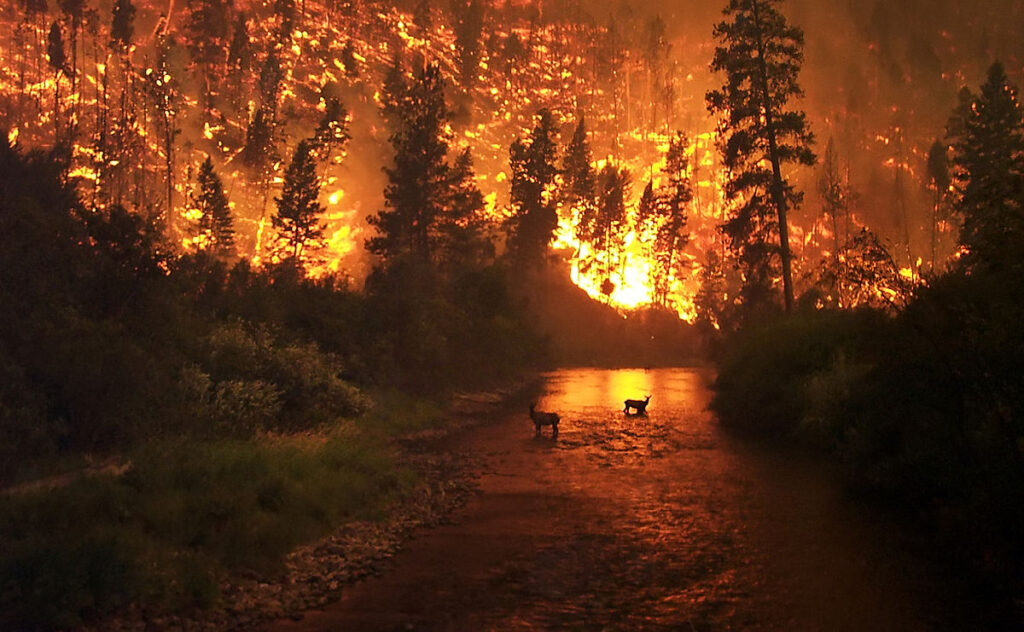Climate Crisis, Conflict, and Legislative Developments
Extreme weather events in summer 2023, including heat waves in Europe, North America, and Asia, and wildfires in Canada and Greece, show that July 2023 was the hottest month ever recorded and had the highest-ever ocean temperatures.
As average global temperatures rise, deaths, injuries, and displacement of persons from climate-related disasters increase, as do mortality and illness from heat waves, drought, disease, and malnutrition.

Extreme weather events contribute to displacement and conflict. Image courtesy of John McColgan is in the public domain.
These disasters have more than quadrupled in both cost and frequency since the 1980s. Between 2018-2023, the US has spent an average of $126 billion per year on disaster events. In 2021, Hurricane Ida in Louisiana sustained winds of 150 mph and heavily damaged the state’s energy infrastructure leaving millions without electricity for nearly a week and costing an estimate of $76 billion.
Intergroup political conflict (the conflict between two or more groups) increases with low-water availability, extreme temperatures, and climate-induced changes in income. In 2015, the U.S. Department of Defense issued a report asserting that “climate change is an urgent and growing threat to our national security, contributing to increased natural disasters, refugee flows, and conflicts over basic resources such as food and water. These impacts are already occurring, and the scope, scale, and intensity of these impacts are projected to increase over time.”
Drought, fires, displacement, and floods make people less economically stable and more desperate. Conflict arises over access to scarce water, food, housing, and other resources. For example, in Rwanda, drought-induced hunger fueled the genocide in 1994 in which 800,000 people were murdered. Additionally, increasing desertification in Sudan’s Darfur region led to fighting in 2003 between herders and farmers over scarce water. The violence expanded into a genocide that continues today.
The greater the increase in average temperature, the greater the harmful effects on the rights to life, health, food, housing, self-determination, and education.
International Developments on the Climate Crisis
The relationship between climate and human rights has received increasing attention from the United Nations Human Rights Council, governments, and international bodies. Two major international developments include the United Nations Framework Convention on Climate Change (UNFCC), and the Paris Agreement.
The UNFCC is an agreement to stabilize greenhouse gas concentrations at a level that would not interfere with the climate system and to do so in a timely, sustainable, and environmentally sound manner. It has near-universal membership with 198 countries, including the United States.
The Paris Agreement is an accord to reduce greenhouse gas emissions that cause global warming. It was adopted in 2015, signed by 194 nations, and entered into force in 2016. In 2017 the U.S. administration, originally a signatory, withdrew from the Agreement. The U.S. rejoined the Paris Agreement in January 2021.
U.S. Developments to Mitigate the Climate Crisis
The Inflation Reduction Act is the most significant piece of climate legislation in U.S. history. Nearly $400 billion will be allocated over a decade, to reduce carbon emissions. These funds will be disbursed through a combination of tax incentives, grants, and loan guarantees.
Additionally, other domestic developments include the sale of electric vehicles, the increase of solar energy, and the increase in the use of global wind energy and green energy.
Ecocide
In 2020, the Stop Ecocide Foundation developed an international legal definition of ecocide: “Ecocide means unlawful or wanton acts committed with knowledge that there is a substantial likelihood of severe and either widespread or long-term damage to the environment being caused by those acts.”
Efforts have made by international organizations, legal scholars, and environmental advocates to make ecocide an international crime and this movement is gaining momentum. The goal is to propose ecocide as the fifth international crime under the Rome Statute. In 2023, the European Parliament has voted to make ecocide a crime. In 2024, the Pacific Islands of Fiji, Vanuatu, and Samoa submitted a proposal to the International Criminal Court to recognize ecocide as a core international human rights crime alongside genocide, crimes against humanity, and war crimes.
This page was authored for World Without Genocide by Joanna Michalopoulos, Law and Human Rights Intern.
Updated: September 2024.
Legislation Regarding Ecocide and Selected Legal Developments
To further support national and global developments, click here.
Read about climate migration and the law here.
Learn more about the link between climate change and conflict here.
Find out how your city be affected by climate change here.
Find resources including scholarly articles, fiction and non-fiction books, documentaries, and other resources about climate change here.
Take action here.
References
Bordoff, Jason. “America’s Landmark Climate Law.” International Monetary Fund, December 2022, https://www.imf.org/en/Publications/fandd/issues/2022/12/america-landmark-climate-law-bordoff
Copernicus. “July 2023 sees multiple global temperature records broken.” Copernicus, 8 August. 2023, https://climate.copernicus.eu/july-2023-sees-multiple-global-temperature-records-broken
Chiglinksy, Katherine. “Hurricane Ida could cost insurers almost $18BN.” Aljazeera, 1 Sept. 2021, https://www.aljazeera.com/economy/2021/9/1/hurricane-ida-could-cost-insurers-almost-18bn
United Nations, “What is the United Nations Framework Convention on Climate Change?” United Nations, 2023, https://unfccc.int/process-and-meetings/what-is-the-united-nations-framework-convention-on-climate-change
United Nations, “What is the Paris Agreement?” United Nations, 2023, https://unfccc.int/process-and-meetings/the-paris-agreement


